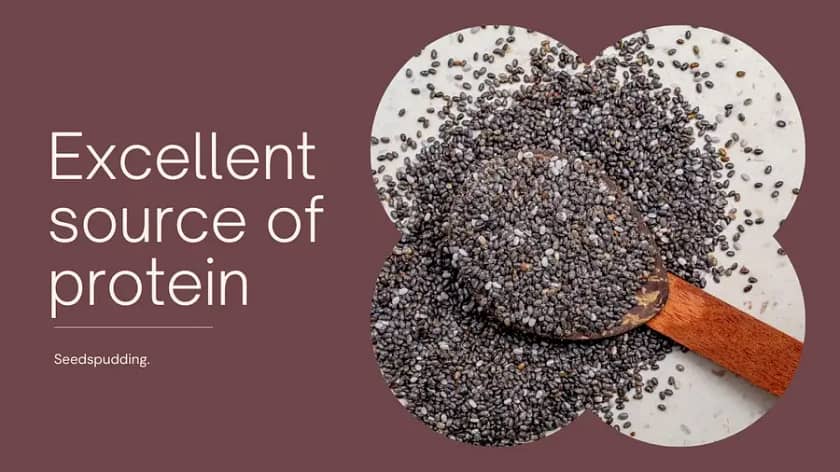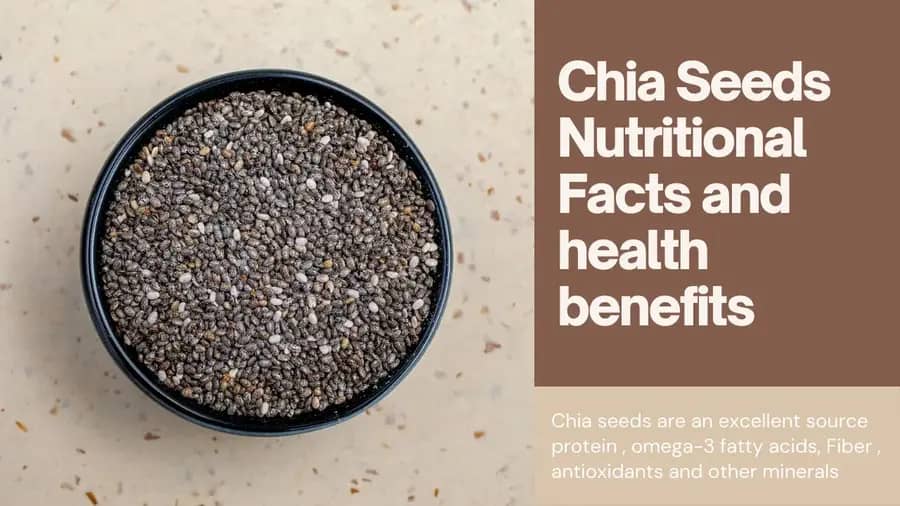Chia seed are tiny, round black seeds of chia plant (Salvia hispanica). Chia seeds provide nutritional value by offering various health benefits. They contain large amount of fiber , protein, vitamins , minerals and are also rich in antioxidants.
They may boost your energy level and also promote good heart health. With various health benefits, vitamins and minerals these seeds are a must in many health-conscious diets.
Chia seeds are very versatile because of the fact that they are very easy to add in any diet. Chia seeds can be soaked in water making it a chia seed water which is very nutritious for health or you can sprinkle them on salads/yogurts as topping or even make a chia seed pudding.
Let’s discuss chia seeds nutritional facts and explore various health benefits that chia seeds offer.
Table of Contents
ToggleChia Seeds Nutrition Facts
Chia seeds contain 4.68 gram of protein per 28.35 g
Although chia seeds are small in size, chia seeds are loaded with essential nutrients.
Note : Chia seeds are gluten free.
The nutrients in 28.35g of chia seeds are listed below :
- Energy: 138 kcal
- Water: 6%
- Protein: 4.68g
- Sugar: 0g
- Carbs: 12g
- Fat: 8.7g
- Fiber: 9.75g
- Calcium, Ca: 179mg
- Iron: 2.19mg
- Magnesium: 95mg
- Sodium: 4.54mg
- Vitamin C: 0.454mg
- Sodium: 4.54mg
Omega-3 Fatty Acids
Chia seeds is one of the best sources of omega-3 fatty acids, particularly alpha-linolenic acid (ALA).
Omega-3s are vital for your heart health, brain function, and reducing inflammation in the body.
Chia seeds are the best plant based source for omega-3 fatty acids.
Omega-3 fatty acids are believed to reduce inflammation in your body as they have anti inflammatory properties (1).

Protein
Chia seeds are excellent source of protein. Which contains all nine essential amino acids.
Chia seeds have 4.68 gram of protein per 28.35 gram of chia seeds and 16.5 gram per 100 gram of chia seeds (2).
This makes them an ideal addition to vegetarian and vegan diets, helping to support muscle growth, repair, and overall health.
Fiber
28g of chia seeds provides 9.75 grams of fiber. Which makes them an excellent choice for improving digestive health and supporting in weight management.
Fiber also helps in regulating blood sugar levels which keeps you full and satisfied.
Chia seeds contain 80 percent of the carbs in the form of fiber.
Antioxidants
Chia seeds are rich in antioxidants. These powerful antioxidants help protect cells from damage caused by free radicals, reducing the risk of chronic diseases such as cancer and heart disease.
Vitamins and minerals
Chia seeds contain plenty of minerals and vitamins. Some of which are listed below.
Calcium
Chia seeds are an excellent source of calcium, a mineral that is essential for maintaining strong and healthy bones and teeth.
Calcium is the most abundant minerals in our body (3).
Calcium plays an important role in muscle function and blood clotting. So, by adding chia seeds into your diet you can help prevent osteoporosis and support overall bone health, especially in individuals who are lactose intolerant or those who do not consume dairy products.
Magnesium
Magnesium is another mineral found abundantly in chia seeds.
It plays a crucial role in over 300 biochemical reactions in the body, including energy production, muscle function, and nerve transmission.
Magnesium also helps regulate blood pressure, maintain heart health, and support a healthy immune system.
Phosphorus:
Chia seeds are a good source of phosphorus, a mineral that is essential for bone health, energy metabolism, and cell repair and maintenance.
Phosphorus also plays a role in maintaining pH balance in the body and supporting kidney function.
Zinc
Chia seeds are a good source of zinc. Which is an essential trace mineral which plays a role in building the immunity of body, healing of your wounds, DNA synthesis, and cell division
Zinc also acts as an antioxidant. Which protects the cells from damage caused by free radicals.
Iron
Iron is another mineral that is found in chia seeds. Iron plays a crucial role in the production of hemoglobin.
Which is a protein in red blood cells which task is to carry oxygen from the lungs to the rest of the body.
Chia seeds contain a moderate amount of iron, making them a valuable source of this essential mineral, especially for individuals at risk of iron deficiency, such as pregnant women and vegetarians.
Potassium
Potassium is an electrolyte which helps regulate the fluid balance, and muscle contractions.
Potassium is vital for maintaining proper heart function and blood pressure levels.
Chia seeds contain a moderate amount of potassium, making them a valuable addition to a heart-healthy diet.
Chia Seeds Health Benefits
Now that we understand the nutritional profile of chia seeds, let’s explore the health benefits of chia seeds as well.
Good For your Heart
The omega-3 fatty acids found in chia seeds play a crucial role in maintaining heart health by reducing inflammation, lowering cholesterol levels, and regulating blood pressure.
Adding chia seeds into your daily diet can help reduce the risk of heart disease and stroke.
Blood Sugar Control
The combination of fiber, protein, and healthy fats in chia seeds makes them an excellent choice for stabilizing blood sugar levels.
Studies have shown that chia seeds improves blood sugar control (4).
Consuming chia seeds can help prevent spikes and crashes in blood sugar, making them particularly beneficial for individuals with diabetes or insulin resistance.
Bone Health
As we have discussed in this article that chia seeds are a great source of calcium, magnesium, and phosphorus. All these minerals are essential for maintaining strong and healthy bones.
Besides bone health chia seeds are also good for your skin.
Improves fiber intake
Chia seeds contains both soluble and insoluble fiber.
Which makes them a versatile and effective way to increase fiber intake. Soluble fiber dissolves in water to form a gel-like substance in the digestive tract, which helps slow down digestion and promotes feelings of fullness.
On the other hand, insoluble fiber adds bulk to stool, facilitating regular bowel movements and preventing constipation.
Does chia seeds have any side effect
Chia seeds are generally safe to eat which little or no side effects.
However chia seeds may cause digestive discomfort like bloating or gas due to their high fiber content.
Some individuals may also experience allergic reactions or interact with certain medications.
Moderation is key and consulting a healthcare provider are advisable, especially for those with existing health conditions or concerns.
Final words
Chia seeds are an excellent source protein , omega-3 fatty acids, Fiber , antioxidants and other minerals discussed above.
Chia seeds have tons of health benefits and have been linked to improve your fiber intake, bone health and heart health as well.
So, do add them in your diet as these little seeds are way too nutritious to miss out.






1 thought on “Chia Seeds: Complete Nutrition Facts and heath benefits.”